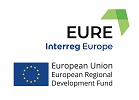News
EURE
The EURE project – Effectiveness of Environmental Urban policies to improve Resources Efficiency – proposed the exchange of experience among local authorities as methodology to evaluate the different ways to articulate the 5% of their European Regional Development Fund (ERDF) to support integrated sustainable urban development.
Project funded under the European Regional Development Fund of the European Union, 2019 - 2023
Highlights
The EURE project has been working to improve the participation of small, medium and peripheral cities in the definition and more effective implementation of European Urban Policy. On 22 and 23 March 2023, EURE partners and stakeholders came together for a final congress in Alba Iulia, Romania, to review the effectiveness of environmental urban policies to improve resource efficiency.
{slider THE PROJECT}
The Europe 2020 strategy recognizes that urban areas are the main resources consumers and the main responsible for the urban environment quality. The project aimed to improve the regional development policies in order to increase resource-efficiency, green growth, eco-innovation and environmental performance management of the urban areas. The EURE project’s objective was to improve the way the European Regional Development Fund (ERDF) Regulation addresses the environmental urban challenges of cities, paying also attention to those cities of small dimension but with influence in the sparsely populated areas where they are located. The final aim was:
- to support European urban areas in being more resource-efficient
- to include, as transversal priority of the integrated urban policies, the principles of circular economy, and
- to assure a proper environmental performance management at urban level.
{slider ACTIVITIES}
As Advisory partner, ACR+’s role in the project was two-fold. On the one hand, ACR+ supported the baseline situation analysis on urban environmental policies, gathering and benchmarking of good practices. Furthermore, ACR+ supported the design of local action plans, facilitating capacity building activities and peer working between partners and the project’s pool of experts.
On the other hand, ACR+ supervised the project’s communication activities, in particular managing the website and publishing newsletters and press releases, to ensure visibility, engagement and networking.
{slider PARTNERS INVOLVED}
EURE’s lead partner was Eixo, Atlantic Axis of Peninsular Northwest (ES)*. The other partners were:
|
|
*ACR+ members
{/sliders}













